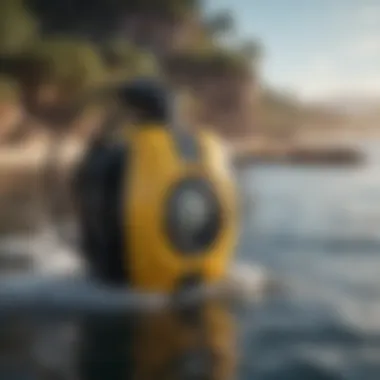Unveiling the Impact of Ozone Pump in Watersports: An In-Depth Guide


Water Activity Overview
Ozone pump technology has revolutionized the world of watersports, offering unprecedented benefits to enthusiasts across various activities. Explore how ozone pump systems influence surfing, sailing, snorkeling, and paddleboarding experiences, elevating them to new levels of efficiency and sustainability.
Tips and Techniques
Unleash the full potential of ozone pump technology with tailored tips for beginners looking to enhance their water activities. Delve into advanced techniques designed for experienced watersports enthusiasts seeking to maximize the benefits of ozone pump systems. Prioritize safety with expert guidelines ensuring a secure and enjoyable experience on the water.
Gear Reviews
The integration of ozone pump technology into gear is reshaping the watersports landscape. Review the latest innovations in surfboards, sailboats, snorkeling equipment, paddleboards, and wetsuits equipped with ozone pump systems, analyzing how these enhancements influence performance and environmental impact.
Destination Guides
Embark on a journey to popular watersports locations where ozone pump technology is making waves. Discover hidden gems and lesser-known spots ideal for water enthusiasts seeking unique experiences. Travel smart with essential tips for planning water sports trips, considering factors like ozone pump availability and environmental sustainability.
Intro to Ozone Pump
In this comprehensive guide titled 'Exploring the Impact of Ozone Pump in Watersports,' the importance of ozone pump technology in the realm of watersports is unveiled. This article delves deep into the functionality, advantages, and implications of utilizing ozone pump systems in aquatic activities. By understanding the fundamental aspects of ozone pump technology, enthusiasts can gain valuable insights into how this innovation enhances their water-centric pursuits.
Understanding Ozone Pump Technology
The Science Behind Ozone Pump
Exploring the intricacies of the science behind ozone pump reveals a sophisticated process that involves ozone generation. This mechanism plays a pivotal role in water purification and sterilization, crucial for maintaining clean water environments in watersports settings. The unique characteristic of this system lies in its ability to harness ozone's powerful oxidizing properties effectively. Despite its complexities, the science behind ozone pump simplifies water treatment, making it a popular choice for enhancing water quality in various activities.
Ozone Generation Process
At the core of ozone pump technology lies the ozone generation process, a key component that drives the purification efforts in watersports. By elucidating this process, we uncover the efficient production of ozone gas used to eliminate contaminants in water. The distinctive feature of this process is its non-chemical approach to water treatment, minimizing the reliance on traditional cleansing agents. While offering substantial benefits in water purification, the ozone generation process also presents challenges regarding optimal efficiency and control.


Role of Ozone in Watersports
Understanding the role of ozone in watersports underscores its significant contribution to the overall aquatic experience. Ozone plays a crucial role in maintaining water clarity, removing impurities, and ensuring a safe recreational environment for enthusiasts. Its unique feature lies in its ability to disinfect gear, prolonging equipment lifespan and promoting hygienic practices. Despite its advantages, the role of ozone in watersports necessitates careful consideration of its potential limitations and environmental implications.
Applications of Ozone Pump
Purification in Water Activities
The application of ozone pump in water activities signifies a paradigm shift towards eco-friendly purification methods. By utilizing ozone for water treatment, enthusiasts can embrace sustainable practices that reduce their chemical footprint. The key characteristic of ozone pump in purification lies in its ability to target contaminants effectively, minimizing water pollution and preserving aquatic ecosystems. While offering numerous benefits, this application requires meticulous monitoring to ensure optimal purification outcomes.
Use in Gear Sterilization
Gear sterilization through ozone pump technology signifies a breakthrough in equipment maintenance for watersports enthusiasts. By implementing ozone-based sterilization, gear longevity is significantly enhanced, reducing the risk of microbial contamination. The unique feature of using ozone for gear sterilization lies in its non-invasive approach, protecting gear materials while effectively eliminating harmful pathogens. To maximize the advantages of this application, careful consideration of its disadvantages and technical requirements is paramount.
Benefits for Water Quality
The benefits of ozone pump technology extend to improving water quality in aquatic environments, essential for sustaining healthy ecosystems. By enhancing water quality, ozone pump systems foster a safe and enjoyable experience for watersports participants. The key characteristic of ozone pump in water quality maintenance is its ability to target pollutants without compromising natural resources. Although offering extensive benefits, this application requires thorough assessment to address potential drawbacks and ensure long-term water quality improvements.
Environmental Implications of Ozone Pump
In the expansive realm of watersports, understanding the environmental implications of ozone pump technology holds paramount importance. The integration of ozone pump systems in water-related activities signifies a pivotal shift towards sustainable practices. By harnessing ozone's powerful oxidizing properties, various benefits emerge, ranging from purification in water activities to gear sterilization. The conscientious utilization of ozone pump systems not only enhances water quality but also fosters eco-friendly initiatives within the watersports community.
Sustainable Practices with Ozone Pump
Reducing Chemical Footprint
Delving into the realm of reducing the chemical footprint, a critical facet of ozone pump technology, unveils a strategic approach towards environmental preservation. By minimizing reliance on chemical agents, ozone pump systems pave the way for a cleaner, greener watersports landscape. The key characteristic of reducing the chemical footprint lies in its ability to mitigate the harmful effects of traditional water treatment methods, making it a preferred choice for eco-conscious enthusiasts. The distinctive feature of reducing the chemical footprint is its lesser impact on aquatic ecosystems, advocating for a healthier marine environment.
Minimizing Water Pollution


Focusing on minimizing water pollution through ozone pump technology showcases a concerted effort to safeguard aquatic ecosystems. The inherent ability of ozone to target and eliminate contaminants in water bodies plays a vital role in curbing pollution levels. The key characteristic of minimizing water pollution is its direct impact on improving water quality, making it a popular choice for sustainable water management practices. The unique feature of this approach lies in its proactive stance against pollutants, ultimately leading to cleaner and safer water environments.
Promoting Eco-Friendly Initiatives
Promoting eco-friendly initiatives through the utilization of ozone pump systems underscores a shift towards responsible watersports operations. By embracing environmentally conscious practices, the watersports community aligns itself with global sustainability goals. The key characteristic of promoting eco-friendly initiatives is its ability to instigate positive change through greener technologies, rendering it a commendable choice for this article. The unique feature of this advocacy lies in its ripple effect, inspiring others to adopt eco-sensitive approaches for long-term environmental benefits.
Challenges and Solutions
Overcoming Regulatory Hurdles
Navigating regulatory hurdles associated with ozone pump technology presents a formidable challenge yet offers opportunities for innovation. By addressing regulatory frameworks governing ozone pump usage, the watersports sector can enhance compliance and operational efficiency. The key characteristic of overcoming regulatory hurdles is the streamlining of processes to meet requirements, positioning it as a beneficial choice for industry adherence. The unique feature here lies in the potential for standardizing ozone pump practices, ensuring consistent environmental protection measures.
Ensuring Ozone Pump Efficiency
Ensuring the efficiency of ozone pump systems in watersports settings is crucial for yielding optimal results while minimizing resource consumption. By fine-tuning system performance and monitoring ozone levels, efficiency standards can be maintained at peak levels. The key characteristic of ensuring ozone pump efficiency is the continuous improvement approach, making it a popular choice for sustainable water treatment initiatives. The unique feature of this endeavor lies in its capacity to maximize ozone utilization, significant for enhancing water quality and operational effectiveness.
Addressing Environmental Concerns
Addressing prevalent environmental concerns within watersports is imperative for ensuring long-term sustainability and ecological stewardship. By proactively identifying and mitigating potential environmental challenges, the industry can uphold its commitment to responsible practices. The key characteristic of addressing environmental concerns is the emphasis on proactive measures to safeguard water ecosystems, validating it as a beneficial choice for this article. The unique feature here lies in fostering collaboration among stakeholders, paving the way for collective solutions to complex environmental issues.
Future Prospects of Ozone Pump in Watersports
In this insightful section about the future prospects of ozone pump in watersports, we delve into the pivotal role that technology plays in shaping the landscape of aquatic activities. As we embrace advancements and innovations, it is imperative to understand how these developments can elevate the watersports domain to new heights. By exploring the potential trajectories and enhancements, enthusiasts can anticipate a dynamic and progressive arena for their recreational pursuits.
Technological Innovations
Enhanced Ozone Pump Systems
Enhanced ozone pump systems stand at the forefront of technological evolution within watersports. Their refined engineering and heightened efficiency contribute significantly to water purification processes. The key characteristic of these systems lies in their ability to generate ozone with unparalleled precision and purity. This feature sets them apart as a superior choice for maintaining water quality in aquatic environments. Despite their prowess, challenges such as maintenance complexities may arise, necessitating careful consideration in implementing these advanced systems.


Smart Applications in Water Activities
Smart applications in water activities signify a pivotal shift towards automated and intelligent ozone pump utilization. By integrating sensor technologies and data analytics, these applications optimize ozone usage for maximum efficacy. The standout feature of smart applications is their capacity to adapt to varying water conditions in real time, ensuring optimal sterilization levels. While their benefits are undeniable, drawbacks like initial setup costs and technical dependencies underline the nuanced nature of integrating smart technologies within watersports facilities.
Potential Growth Areas
Exploring potential growth areas unveils compelling opportunities for expanding the ozone pump's influence in watersports. These areas highlight future advancements that may revolutionize water treatment methods and enhance user experiences. The primary characteristic of these growth areas is their ability to not only meet current demands but also anticipate and address emerging needs in the evolving watersports sector. While their advantages are promising, factors like scalability and regulatory compliance must be carefully navigated to harness the full potential of these burgeoning areas.
Collaborative Initiatives
Industry Partnerships for Sustainability
Industry partnerships for sustainability signify a collective commitment towards environmentally conscious practices in ozone pump utilization. The key characteristic of these partnerships is their collaborative approach towards promoting ecological balance and resource conservation. By fostering synergies between stakeholders, industry partnerships create a robust framework for implementing sustainable initiatives within watersports. Despite their advantages in promoting eco-friendly measures, challenges involving variable priorities and resource allocation may impede the seamless execution of these collaborative endeavors.
Research and Development Endeavors
Research and development endeavors underscore the continuous pursuit of innovation and improvement within the ozone pump domain. Their key characteristic lies in driving technological advancements that push the boundaries of existing capabilities. By investing in R&D, stakeholders propel the evolution of ozone pump systems, paving the way for enhanced performance and efficiency. While the benefits of these endeavors are vast, considerations such as investment risks and time-to-market pressures introduce complexities that require diligent management.
Community Engagement Efforts
Community engagement efforts emphasize the vital role of public participation in advocating for responsible ozone pump practices. The key characteristic of these initiatives is their capacity to nurture awareness and knowledge-sharing within local communities. By empowering individuals to champion environmental causes, community engagement contributes to a more sustainable watersports ecosystem. However, challenges such as outreach effectiveness and behavioral changes underscore the ongoing nature of fostering community engagement in ozone pump initiatives.
Epilogue
Summarizing Ozone Pump's Role
Summarizing ozone pump's role encapsulates the overarching impact of this technology on watersports and environmental stewardship. The key characteristic of this summation is its ability to distill complex concepts into actionable insights for enthusiasts and industry professionals alike. By highlighting the multifaceted benefits of ozone pump applications, this summary underscores its instrumental role in shaping a cleaner and safer watersports landscape. Despite its advantages, the necessity for continuous adaptation and refinement remains imperative to ensure the sustained efficacy and relevance of ozone pump solutions.
Impact on Watersports Landscape
Examining the impact on the watersports landscape illuminates how ozone pump technologies have catalyzed positive transformations in aquatic leisure activities. The key characteristic of this impact lies in its capacity to enhance the overall experience for watersports enthusiasts while mitigating environmental risks. By fostering a symbiotic relationship between technology and nature, ozone pumps have contributed to fostering a healthier and more sustainable watersports ecosystem. However, challenges related to infrastructure integration and operational scalability underscore the need for strategic planning and seamless execution in realizing the full potential of ozone pump applications.
Looking Ahead: Ozone Pump in Watersports
Looking ahead to the future of ozone pump in watersports foretells a landscape defined by innovation, collaboration, and sustainability. The key characteristic of this forward-looking perspective is its emphasis on setting strategic objectives and embracing dynamic changes in the watersports sector. By anticipating upcoming trends and challenges, stakeholders can position themselves at the vanguard of ozone pump integration, ensuring its continued relevance and impact. While opportunities for growth and development abound, considerations surrounding regulatory frameworks and technological disruptions necessitate foresight and adaptability in navigating the evolving watersports terrain.















